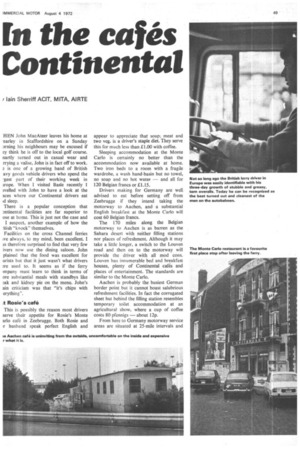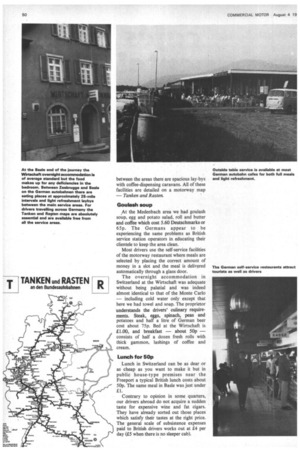Fn the cafés
Page 51

Page 52

If you've noticed an error in this article please click here to report it so we can fix it.
Continental
(lain Sherriff ACIT, MITA, AIRTE HEN John MacAteer leaves his home at .earley in Staffordshire on a Sunday arning his neighbours may be excused if ey think he is off to the local golf course. nartly turned out in casual wear and rrying a valise. John is in fact off to work. e is one of a growing band of British avy goods vehicle drivers who spend the -gest part of their working week in trope. When I visited Basle recently I welled with John to have a look at the aces where our Continental drivers eat id sleep.
There is a popular conception that 3ntinental facilities are far superior to use at home. This is just not the case and I suspect, another example of how the itish "knock" themselves.
Facilities on the cross Channel ferries lye always, to my mind, been excellent. I Is therefore surprised to find that very few ivers now use the dining saloon. John plained that the food was excellent for urists but that it just wasn't what drivers ere used to. It seems as if the ferry ,mpany must learn to think in terms of ore substantial meals with standbys like :ak and kidney pie on the menu. John's am n criticism was that "it's chips with erything".
t Rosie's café
This is possibly the reason most drivers serve their appetite for Rosie's Monte ado cafe in Zeebrugge. Both Rosie and :r husband speak perfect English and appear to appreciate that soup; meat and two veg. is a driver's staple diet. They serve this for much less than £1.00 with coffee.
Sleeping accommodation at the Monte Carlo is certainly no better than the accommodation now available at home. Two iron beds to a room with a fragile wardrobe, a wash hand-basin but no towel, no soap and no hot wateF — and all for 120 Belgian francs or £1.15.
Drivers making for Germany are well. advised to eat before setting off from Zeebrugge if they intend taking the motorway to Aachen, and a substantial English breakfast at the Monte Carlo will cost 60 Belgian francs.
The 170 miles along the Belgian motorway to Aachen is as barren as the Sahara desert with neither filling stations nor places of refreshment. Although it may take a little longer, a switch to the Louven road and then on to the motorway will provide the driver with all mod cons. Louven has innumerable bed and breakfast houses, plenty of Continental cafes and places of entertainment. The standards are similar to the Monte Carlo.
Aachen is probably the busiest German border point but it cannot boast salubrious refreshment facilities. In fact the corrugated sheet hut behind the filling station resembles temporary toilet accommodation at an agricultural show, where a cup of coffee costs 80 pfennigs — about 12p.
From here to Germany motorway service areas are situated at 25-mile intervals and
between the areas there are spacious lay-bys with coffee-dispensing caravans. All of these facilities are detailed on a motorway map — Tanken and Rasten.
Goulash soup ,At the Medenbach area we had goulash soup, egg and potato salad, roll and butter and coffee which cost 5.60 Deutschmarks or 65p. The Germans appear to be experiencing the same problems as British service station operators in educating their clientele to keep the area clean.
Most drivers use the self-service facilities of the motorway restaurant where meals are selected by placing the correct amount of money in a slot and the meal is delivered automatically through a glass door.
The overnight accommodation in Switzerland at the Wirtschaft was adequate without being palatial and was indeed almost identical to that of the Monte Carlo — including cold water only except that here we had towel and soap. The proprietor understands the drivers' culinary requirements. Steak, eggs, spinach, peas and potatoes and half a litre of German beer cost about 75p. Bed at the Wirtschaft is £1.00, and breakfast — about 50p — consists of half a dozen fresh rolls with thick gammon, lashings of coffee and cream.
Lunch for 50p Lunch in Switzerland can be as dear or as cheap as you want to make it but in public house-type premises near the Freeport a typical British lunch costs about 50p. The same meal in Basle was just under El.
Contrary to opinion in some quarters, our drivers abroad do not acquire a sudden taste for expensive wine and fat cigars. They have already sorted out those places which satisfy their tastes at the right price. The general scale of subsistence expenses paid to British drivers works out at £.4 per day (£.5 when there is no sleeper cab).








































































































